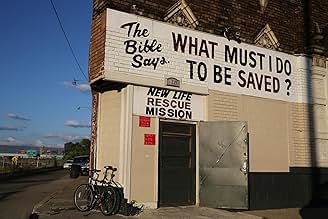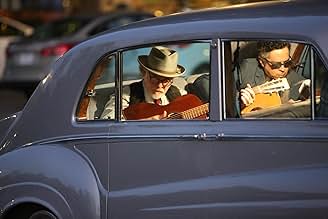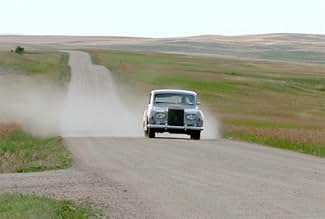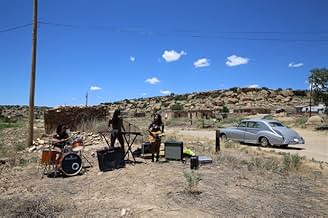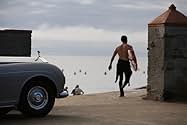IMDb-BEWERTUNG
6,9/10
1308
IHRE BEWERTUNG
Füge eine Handlung in deiner Sprache hinzuForty years after the death of Elvis Presley, a musical road trip across America in his 1963 Rolls Royce explores how a country boy lost his authenticity and became a king while his country ... Alles lesenForty years after the death of Elvis Presley, a musical road trip across America in his 1963 Rolls Royce explores how a country boy lost his authenticity and became a king while his country lost her democracy and became an empire.Forty years after the death of Elvis Presley, a musical road trip across America in his 1963 Rolls Royce explores how a country boy lost his authenticity and became a king while his country lost her democracy and became an empire.
- Regie
- Drehbuch
- Hauptbesetzung
- Auszeichnungen
- 1 Gewinn & 10 Nominierungen insgesamt
Elvis Presley
- Self
- (Archivfilmmaterial)
Mike Tyson
- Self
- (Archivfilmmaterial)
EmiSunshine
- Self
- (as Emi Sunshine & The Rain)
Franklin D. Roosevelt
- Self
- (Archivfilmmaterial)
Leo Bud Welch
- Self
- (as Leo "Bud" Welch)
Martin Luther King
- Self
- (Archivfilmmaterial)
Empfohlene Bewertungen
"Celebrity is the industrial disease of creativity." Mike Myers
It is commonly thought that America is in decline for the greatness it knew after WWII. Writer/director Eugene Jarecki has a vision in The King of a similar decline in Elvis Presley' life from unique, authentic talent to a has-been dead in his forties. This best-so-far-this-year documentary begs us to consider the analogy although to its credit, it does not force the similarities.
The film's interesting conceit suggests that both subjects bear their own responsibility for their descent-Elvis giving into commercialism and drugs, America, well, introducing itself to solipsism and commercialism, culminating in the election of Donald Trump. While America is a decline in progress, Elvis gave up 30 years ago but has never been forgotten.
That's the rub-he achieved artistically and financially beyond even Col. Parker's wildest expectations, but Elvis was not able to handle the fame or the money. Or maybe when you can buy all the cheeseburgers and drugs you want, you can watch your belly grow as your mind shuts down. Jarecki uses Elvis's 1963 Rolls Royce to have performers like Immortal Technique and Emi Sunshine sing in the back seat about America.
As Jarecki winds in the Rolls from Memphis to New York, Vegas, and back to Memphis, it slowly becomes clear this should been one of Elvis's pretty Cadillac's; how ironically perfect that it's a Rolls, so out of touch with his roots.
Besides the simple lamentation of greatness gone too soon is the argument that Elvis appropriated Black culture on his road to fame and wealth. Although arguments abound on both sides, this point illustrates the varied richness Jarecki brings to his documentary,
At any rate, having just watched Whitney about her great voice and its descent with the help of drugs, I am dismayed that such is sometimes the fate of the great. America is no different, and the frequently-montaged images from presidents to celebrities are sometimes surprising, sometimes depressing, but never dull. Jarecki has a gallery of shots that would be impressive even without sound. It's a museum of our glory and our loss.
Along this nostalgic road, and America itself seems to be stuck there without a clue about how to save its future from the decision it made in 2016, is the prevailing idea that Elvis also followed the money and the easy way. We see how he ended up, so can we learn and make some tough decisions now?
It is commonly thought that America is in decline for the greatness it knew after WWII. Writer/director Eugene Jarecki has a vision in The King of a similar decline in Elvis Presley' life from unique, authentic talent to a has-been dead in his forties. This best-so-far-this-year documentary begs us to consider the analogy although to its credit, it does not force the similarities.
The film's interesting conceit suggests that both subjects bear their own responsibility for their descent-Elvis giving into commercialism and drugs, America, well, introducing itself to solipsism and commercialism, culminating in the election of Donald Trump. While America is a decline in progress, Elvis gave up 30 years ago but has never been forgotten.
That's the rub-he achieved artistically and financially beyond even Col. Parker's wildest expectations, but Elvis was not able to handle the fame or the money. Or maybe when you can buy all the cheeseburgers and drugs you want, you can watch your belly grow as your mind shuts down. Jarecki uses Elvis's 1963 Rolls Royce to have performers like Immortal Technique and Emi Sunshine sing in the back seat about America.
As Jarecki winds in the Rolls from Memphis to New York, Vegas, and back to Memphis, it slowly becomes clear this should been one of Elvis's pretty Cadillac's; how ironically perfect that it's a Rolls, so out of touch with his roots.
Besides the simple lamentation of greatness gone too soon is the argument that Elvis appropriated Black culture on his road to fame and wealth. Although arguments abound on both sides, this point illustrates the varied richness Jarecki brings to his documentary,
At any rate, having just watched Whitney about her great voice and its descent with the help of drugs, I am dismayed that such is sometimes the fate of the great. America is no different, and the frequently-montaged images from presidents to celebrities are sometimes surprising, sometimes depressing, but never dull. Jarecki has a gallery of shots that would be impressive even without sound. It's a museum of our glory and our loss.
Along this nostalgic road, and America itself seems to be stuck there without a clue about how to save its future from the decision it made in 2016, is the prevailing idea that Elvis also followed the money and the easy way. We see how he ended up, so can we learn and make some tough decisions now?
The King is essentially three or four really good documentaries edited into one and that's where the trouble starts. Elvis' life and career are fascinating to watch. And the lies on which the American dream is built - stolen land, slavery, apartheid, the corrupted political system - deserve every effort to refocus public awareness. The roadtrip in Elvis' old Rolls Royce is a nice idea. Just that trying to link his rise and fall to all that happens in America over the past 70 years seems forced and doesn't give each story the necessary time and attention. Viewing The King I felt like watching an interesting docu on TV while someone else got hold of the remote and constantly switches to another channel. 8 Stars for the original idea, 2 Stars for execution.
This is a documentary film that was supposed to be about the America that Elvis helped mold with his brand of rock and roll music, swinging hips, and movie stardom. Oh, and let us not forget how saturated his face and image were marketed on from everything from toys to toasters in the 1950's through 1970's and beyond where he is still considered the King of Rock N Roll.
But really what this documentary unfolds and addresses before our very eyes is the director/writer. Eugene Jarecki's left leaning political view that Elvis Presley and by extension Donald Trump destroyed the American dream and made themselves very wealthy on the backs of hard working Americans that did not look like themselves.
I found the documentary an unfair view of a time in America when Americans were actually prosperous both as a country and as hard working immigrants who made it in America and regardless of their race, religion, or ethnicity either simply enjoyed Elvis Presley and/or wanted to see more and more of Elvis on the stage and in the movies.
Any public image of a politician/musician/film star/author/celebrity can always be criticized for not supporting some group or some cause but why do some writers/directors use this platform of film to disparage others who do not share their own view of the world?
I give the film a 4 out of 10 IMDb rating and I really hope that the Amazon censors will allow my review to remain without pulling it as they may not share my own view which is there have always been two sides to every coin and every controversy.
But really what this documentary unfolds and addresses before our very eyes is the director/writer. Eugene Jarecki's left leaning political view that Elvis Presley and by extension Donald Trump destroyed the American dream and made themselves very wealthy on the backs of hard working Americans that did not look like themselves.
I found the documentary an unfair view of a time in America when Americans were actually prosperous both as a country and as hard working immigrants who made it in America and regardless of their race, religion, or ethnicity either simply enjoyed Elvis Presley and/or wanted to see more and more of Elvis on the stage and in the movies.
Any public image of a politician/musician/film star/author/celebrity can always be criticized for not supporting some group or some cause but why do some writers/directors use this platform of film to disparage others who do not share their own view of the world?
I give the film a 4 out of 10 IMDb rating and I really hope that the Amazon censors will allow my review to remain without pulling it as they may not share my own view which is there have always been two sides to every coin and every controversy.
There is a moment in Eugene Jarecki's mostly successful cinema essay, THE KING, where something to this extent is voiced about the success of "race" music, or black music, in America, "America profited from the enslavement of black culture and then, after resisting giving freedom to that culture for as long as it possibly could, started profiting from the soulful cry that arose from their suffering."
THE KING is most interesting when it's wrestling with this problematic American history through the lens of Elvis Presley - a white performer who rose to mega global super-stardom in large part by mining the music of the African Americans who could never dream of achieving the same level of fame. But THE KING wants to do more than that. It wants to map the entirety of American history on to the life of Elvis. From the early concept of America as an "experiment in democracy" equating it to the early, idealistic, wide-eyed Elvis; to the current America, seemingly synonymous with runaway capitalism, paralleling the bloated, addicted, Vegas Elvis. Sometimes the metaphor works clearly, cleanly, and even profoundly, other times it feels forced. It's not helped by an almost constant quick-cut, manic editing style that never settles into much of a groove. There are two very powerful montages in the last act that drive home the thesis Jarecki is going for, and they are wonders of contextual editing and visual meta-meaning, but because they're dropped at the end of what is essentially a montage-movie, they're impact is muted. What should have been an apex moment in the visual storytelling comes off as just a slight uptick in the pace and rhythm of the film. Apparently there was close to 250 hours of footage shot for the doc, and you can see it in the editing. There's a lot that the filmmakers want you to see, but the pacing, tone, and thematic clarity suffer from a lack of breathing room. Some of the interviews are outstanding. Chuck D, as always, is a national treasure. Ethan Hawk is affable as hell. John Hiatt has one particular moment of emotional clarity that's pretty much worth the price of admission. And, in a surprise powerhouse showing, Mike Myers turns out to be an incredibly astute and impish observer of the American phenomenon. Sadly all of these interviews are really just reduced to sound bites in the frenetic race to get from moment to moment, beat to beat.
I have to also mention the musical performances, which are outstanding, but also, not given a whole lot of room to stretch.
But THE KING is good, you should absolutely see it. THE KING is ambitious. THE KING is even important. If the failures and successes of THE KING were the failures and successes of more modern American art and thought, maybe we wouldn't be in the mess we're in today. Check it out.
THE KING is most interesting when it's wrestling with this problematic American history through the lens of Elvis Presley - a white performer who rose to mega global super-stardom in large part by mining the music of the African Americans who could never dream of achieving the same level of fame. But THE KING wants to do more than that. It wants to map the entirety of American history on to the life of Elvis. From the early concept of America as an "experiment in democracy" equating it to the early, idealistic, wide-eyed Elvis; to the current America, seemingly synonymous with runaway capitalism, paralleling the bloated, addicted, Vegas Elvis. Sometimes the metaphor works clearly, cleanly, and even profoundly, other times it feels forced. It's not helped by an almost constant quick-cut, manic editing style that never settles into much of a groove. There are two very powerful montages in the last act that drive home the thesis Jarecki is going for, and they are wonders of contextual editing and visual meta-meaning, but because they're dropped at the end of what is essentially a montage-movie, they're impact is muted. What should have been an apex moment in the visual storytelling comes off as just a slight uptick in the pace and rhythm of the film. Apparently there was close to 250 hours of footage shot for the doc, and you can see it in the editing. There's a lot that the filmmakers want you to see, but the pacing, tone, and thematic clarity suffer from a lack of breathing room. Some of the interviews are outstanding. Chuck D, as always, is a national treasure. Ethan Hawk is affable as hell. John Hiatt has one particular moment of emotional clarity that's pretty much worth the price of admission. And, in a surprise powerhouse showing, Mike Myers turns out to be an incredibly astute and impish observer of the American phenomenon. Sadly all of these interviews are really just reduced to sound bites in the frenetic race to get from moment to moment, beat to beat.
I have to also mention the musical performances, which are outstanding, but also, not given a whole lot of room to stretch.
But THE KING is good, you should absolutely see it. THE KING is ambitious. THE KING is even important. If the failures and successes of THE KING were the failures and successes of more modern American art and thought, maybe we wouldn't be in the mess we're in today. Check it out.
Late one night, I came upon this little ditty on PBS, as the moon was about say adios. To echo what others have said, this film has an abundance of nice images, and it welcomes a plethora of comments from those who respected, love, and even pitied Elvis. There are some poignant moments from those who were close up to the King. One of the most touching moments comes when a contemporary musician feels such empathy for Elvis, that he can't help but shed painful tears.
As "GORTX" (and other reviewers) have wisely pointed out, the director felt compelled to connect some dots in a bit of a reckless way... particularly when he compares the dynamics of Elvis with today's political climate and the American Dream. When he does this, it somehow minimizes certain parts of the singer's dramatic narrative.
You'll will find some good stuff here, even if you think the political references are not justified. Try to absorb the lively rhythm and zesty imagery. Elvis had an easy charm and a distinct voice. His face was unusually striking. While his physicality might seem superficial, his looks served him well, and propelled his fame to a deeper level.
As "GORTX" (and other reviewers) have wisely pointed out, the director felt compelled to connect some dots in a bit of a reckless way... particularly when he compares the dynamics of Elvis with today's political climate and the American Dream. When he does this, it somehow minimizes certain parts of the singer's dramatic narrative.
You'll will find some good stuff here, even if you think the political references are not justified. Try to absorb the lively rhythm and zesty imagery. Elvis had an easy charm and a distinct voice. His face was unusually striking. While his physicality might seem superficial, his looks served him well, and propelled his fame to a deeper level.
Wusstest du schon
- WissenswertesThe car featured in the documentary is a 1963 Rolls Royce Phantom V touring limousine with coachwork by James Young and was owned by Elvis. It was bought by the film makers at Bonhams auction in 2014 for $396000. It was resold after filming and now resides at the Hard Rock Hotel & Casino in Las Vegas.
- VerbindungenFeatures King Kong und die weiße Frau (1933)
Top-Auswahl
Melde dich zum Bewerten an und greife auf die Watchlist für personalisierte Empfehlungen zu.
- How long is The King?Powered by Alexa
Details
- Erscheinungsdatum
- Herkunftsländer
- Offizieller Standort
- Sprache
- Auch bekannt als
- The King - Elvis und der amerikanische Traum
- Drehorte
- Produktionsfirmen
- Weitere beteiligte Unternehmen bei IMDbPro anzeigen
Box Office
- Bruttoertrag in den USA und Kanada
- 259.291 $
- Eröffnungswochenende in den USA und in Kanada
- 29.050 $
- 24. Juni 2018
- Weltweiter Bruttoertrag
- 273.601 $
- Laufzeit1 Stunde 47 Minuten
- Farbe
- Seitenverhältnis
- 2.35 : 1
Zu dieser Seite beitragen
Bearbeitung vorschlagen oder fehlenden Inhalt hinzufügen



